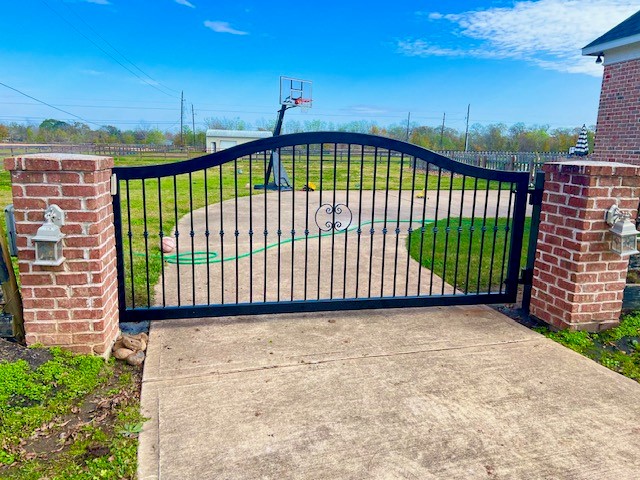Iron Gate Installation for Home Elegance
Iron gates are more than just sturdy and majestic entrances; they’re vital components of robust home security systems. But how do you navigate the realm of iron gate installation? In this guide, we’ll walk you through not only the technicalities but also the latest advancements in the industry—everything from selecting the ideal gate for your property to employing cutting-edge security enhancements—all tailored to boost your home’s composition and safety. Get ready to amplify your home protection as we unlock the secrets of iron gate installation.

Selecting Iron Gate Installation for Home Security
When it comes to selecting iron gate installation for home security, there are several important factors to consider. First and foremost, you need to think about the specific needs of your home and the level of security you desire. Are you primarily concerned about deterring intruders, or do you also want to maintain an aesthetic appeal? For instance, if you live in a neighborhood with low crime rates and your main objective is to enhance the curb appeal, a decorative iron gate with intricate designs might be a suitable choice. On the other hand, if security is your top priority, you may opt for a solid iron gate with minimal ornamental features.
Another crucial aspect to consider is the size and layout of your property. Take accurate measurements of the area where the gate will be installed to ensure it fits properly. If privacy is important to you, consider getting a taller gate that shields your property from prying eyes. Additionally, evaluate whether you need a single swing gate or double swing gate based on the space available and your accessibility preferences.
Consider the material quality and durability of the iron gates as well. Look for gates made of high-quality wrought iron or galvanized steel, as they offer strength and longevity. The gates should also be powder-coated or have protective coatings to prevent rusting and corrosion over time.
Lastly, it’s essential to take into account local regulations and any homeowner association (HOA) restrictions that may govern your choice of iron gates. Consult with your HOA or local authorities to ensure that your selected gate complies with any guidelines or specifications.
Evaluating Home Security Needs
Before proceeding with an iron gate installation for home security, evaluating your unique security needs is crucial. Start by assessing potential vulnerabilities in and around your property. Determine weak points such as entrances that are difficult to secure or areas that provide hiding spots for intruders. Consider the layout of your property, the number of entry points, and any existing security measures you have in place.
Next, think about the level of security you require. Are you looking for a deterrent to discourage intruders, or do you want a comprehensive security system with features such as access control and surveillance cameras? Engaging a professional security consultant can be immensely helpful in determining the appropriate level of security needed based on your specific circumstances.
Take into consideration your lifestyle and daily routines when evaluating your security needs. For example, if you frequently travel or work late hours, you may want to invest in additional security measures such as remote access control or smart home integration.
Additionally, consider potential future needs. Do you anticipate any changes that might affect your security requirements? Perhaps you plan to expand your property or add other structures that will also need secure access points. Thinking ahead can save you time and money down the line.
Remember, every home is unique, so it’s important to conduct a thorough evaluation of your individual security needs before proceeding with an iron gate installation.
Finding Qualified Contractors for Iron Gate Installation
When it comes to installing an iron gate for home security, finding qualified contractors is crucial. While a simple internet search may provide numerous options, it’s essential to take the time to research and evaluate potential contractors thoroughly. Why is this important? Well, the installation process requires expertise and precision to ensure the gate functions effectively as a security measure while enhancing the curb appeal of your home.
Start by asking for recommendations from friends, family, or neighbors who have recently had iron gate installation. Personal referrals can give you valuable insights into the quality of work and customer experience provided by a specific contractor.
For instance, if your neighbor recently had an iron gate installed by a contractor who was professional, punctual, and efficient in their work, that contractor might be worth considering for your project as well.
“I asked around my neighborhood for recommendations on contractors for iron gate installation. One of my neighbors had just installed a beautiful iron gate and highly recommended the contractor they worked with. They praised their attention to detail and ability to deliver the project on time.”
Furthermore, make sure to check online reviews and ratings platforms such as Yelp or Google Reviews. This will give you a broader perspective on different contractors’ reputation and track record of satisfying their clients.
During your evaluation process, consider reaching out to multiple contractors and requesting free estimates. Take advantage of this opportunity to ask them questions about their experience with iron gate installations, their portfolio of past projects, and any relevant certifications or licenses they possess.
Importantly, don’t hesitate to ask for references from previous clients. Speaking directly with those who have hired the contractor in the past can provide valuable insight into their professionalism, reliability, and overall satisfaction with the outcome of their iron gate installation.
Once you have gathered all necessary information about each contractor, take the time to compare their expertise, cost estimates, timelines, warranties, and customer reviews. Ultimately, choose a contractor that not only fits your budget but also demonstrates a high level of expertise in iron gate installation and has a track record of delivering satisfactory results.
Cost and Materials Considerations for Iron Gates
When planning for an iron gate installation, it is important to consider both the cost and materials involved. Iron gates can offer a sturdy and elegant entrance to your home, but they vary greatly in terms of design, size, and complexity. So, what factors influence the cost of installation?
Firstly, the size and design intricacy of the gate play a significant role in determining costs. Larger gates or those with intricate ornamental details may require more materials and labor, resulting in higher prices. Additionally, custom-designed gates may come at a premium due to the unique specifications involved.
Another factor to consider is the type of iron used. Wrought iron is a popular choice due to its durability and aesthetic appeal, but it tends to be more expensive than other types such as cast iron or steel. The thickness of the iron used will also impact cost since thicker gauges provide added security but may come at an increased price.
Additionally, accessories like automatic opening mechanisms or intercom systems can contribute to overall expenses. These features add convenience and security but require additional equipment and professional installation.
Lastly, labor costs vary depending on factors such as location, complexity of the project, and the contractor’s experience. It’s essential to obtain detailed quotes from multiple contractors to ensure you are getting value for your investment.
For instance, if you’re considering installing an iron gate with intricate scrollwork design on a large driveway entrance along with automated opening capabilities, expect higher costs due to increased material requirements and extensive labor involved.
“My husband and I decided to invest in an iron gate for our driveway entrance. We wanted a large gate with ornate details, and we also opted for automated opening mechanisms. After obtaining multiple quotes from contractors, we understood that the cost would be higher due to the complexity of the design and additional equipment required.”
Understanding these cost and materials considerations will help you make informed decisions when planning your iron gate installation project.
Factors Influencing Cost of Installation
When it comes to installing an iron gate for home security, several factors can influence the overall cost of the project. Understanding these factors is crucial in planning and budgeting for your installation. Here are a few key considerations:
- Gate Size and Design: The size and design complexity of your iron gate play a significant role in determining the cost. Larger gates or intricate designs may require additional materials and labor, leading to higher installation expenses.
- Material Quality: The quality of the iron used for your gate will impact its cost. Higher-grade iron is more durable, offering enhanced security and longevity. However, it also tends to be more expensive compared to lower-quality alternatives.
- Gate Automation: If you opt for a motorized or automated iron gate, expect to pay more due to the added components and installation expertise needed. Automation offers convenience and improved security but increases upfront costs.
- Site Preparation: The condition of your existing driveway or entrance area can affect the installation cost. Preparing the site by removing obstructions or uneven surfaces may incur additional expenses.
- Additional Features: Consider whether you want any additional features incorporated into your iron gate, such as intercom systems, keyless entry, or security cameras. These added features will increase the overall cost but provide enhanced functionality and peace of mind.
- Location and Accessibility: The location of your property can impact installation costs as well. Factors like terrain, accessibility, and local building codes might affect labor requirements and equipment usage, potentially influencing the overall expense.
Keep in mind that these factors are not exhaustive and that each installation project is unique. It’s advisable to consult with a professional iron gate installer who can assess your specific needs and provide an accurate estimate tailored to your situation.
Iron Gate Material and Location Options
Iron gates offer both security and aesthetic appeal, making them a popular choice for homeowners. When considering an iron gate installation, it’s essential to explore the various material options and location possibilities. Here are some common choices:
- Wrought Iron: Wrought iron is a classic and durable choice for iron gates. It is known for its elegant look, strength, and resistance to rust and corrosion. Wrought iron gates can be custom-designed to match your aesthetic preferences.
- Steel: Steel gates provide a modern and sleek look while offering exceptional strength and security. They are less prone to damage and require minimal maintenance compared to other materials. Steel gates are available in various finishes such as powder coating or paint.
- Aluminum: Aluminum gates are lightweight yet sturdy, providing a cost-effective alternative to wrought iron or steel. They are resistant to rust and offer versatility in terms of design options. Aluminum gates can be powder coated to achieve different colors and textures.
- Location Options: Iron gates can be installed at various entry points around your property, including the driveway entrance, front yard, or backyard. The location you choose will depend on the specific security needs of your home and personal preferences.
For example, if you prioritize enhancing curb appeal while maintaining security, installing an iron gate at the front yard entrance can create an impressive aesthetic statement.
Ultimately, the material and location choices will vary based on factors like budget, desired aesthetics, level of security needed, and architectural considerations of your property.
Working closely with an experienced iron gate installation professional will ensure you make informed decisions regarding materials and location options that best suit your requirements.
The Iron Gate Installation Process
Installing an iron gate is a significant step towards enhancing the security and aesthetics of your home. It requires careful planning, precise measurements, and skilled craftsmanship to ensure a successful installation. Let’s explore the essential aspects of the iron gate installation process.
First and foremost, a thorough assessment of your property is necessary. Consider factors such as the size and layout of your driveway or entrance, existing structures or landscaping that may affect the gate installation, and any specific design preferences you have in mind. This assessment will help determine the appropriate style, dimensions, and functionality of your iron gate.
Once you have a clear understanding of your requirements, it’s time to consult with a professional iron gate installer. They will guide you through the selection process, helping you choose the right type of iron gate that fits your needs and aesthetic vision. Options range from single swing gates to double swing gates or sliding gates, each offering different benefits depending on available space and desired convenience.
After selecting the type of gate, detailed measurements are taken to ensure accurate fabrication and proper fitting. These measurements include the width and height of the gate opening, as well as considerations for ground slope or any obstructions that need to be accounted for during installation.
With measurements in hand, the fabrication process begins. Skilled craftsmen use high-quality iron materials to create a sturdy structure that meets both functional and aesthetic requirements. The fabrication stage involves welding together various components such as horizontal rails, vertical pickets or scrolls, hinges or tracks, and latch mechanisms. Additionally, any desired decorative elements are incorporated during this process to add an extra touch of elegance to your iron gate.
Once fabrication is complete, it’s time for installation. This stage typically involves digging holes for posts or mounting brackets at predetermined intervals along the driveway or entrance area where the gate will be installed. The precise positioning ensures proper alignment when attaching the gate to its support structure. Careful attention is given to ensuring that the gate swings or slides smoothly, and all components are secure.
The Steps Involved in Gate Installation
Installing an iron gate involves a series of steps that require precision and attention to detail. While the specific steps may vary depending on the type of gate and individual circumstances, here is a general outline of the process:
- Site Preparation: Clear the area where the gate will be installed, removing any debris or obstacles that could impede the installation process.
- Marking and Digging: Mark the desired positions for gate posts or mounting brackets. Dig holes deep enough to provide a stable foundation for the gate, taking into account any local building codes or regulations.
- Setting Posts: Place the gate posts in the prepared holes and ensure they are level and plumb. Use concrete or an appropriate anchoring method to secure the posts in place.
- Attaching Gate Panels: Attach the fabricated gate panels to the posts or mounting brackets using hinges or tracks. Check for proper alignment and adjust as necessary to ensure smooth operation.
- Installing Hardware: Install hardware such as latches, locks, and handles according to manufacturer guidelines. Test all hardware to ensure it functions properly and provides adequate security.
- Finishing Touches: Conduct a final inspection of the installed gate, making sure all components are secure and functioning correctly. Apply any desired finishes or coatings to protect against rust or corrosion.
Maintaining Your Iron Gate for Continued Security
Ensuring the long-term security of your iron gate requires regular maintenance and attention. By implementing a thorough maintenance routine, you can prevent potential issues and keep your gate operating at its optimal level to safeguard your home. Consider the following essential steps for maintaining your iron gate:
Regular Cleaning: To keep your iron gate in prime condition, it’s important to clean it regularly. Use a gentle cleanser or mild soap mixed with water to remove dirt, dust, and debris from the gate’s surface. Avoid using abrasive cleaners or tools that may cause scratches. Gently scrub with a soft brush or sponge, paying close attention to intricate details and hard-to-reach areas. Rinse thoroughly with water and pat dry.
Inspection and Repair: Perform routine inspections of your iron gate to identify any signs of wear, damage, or malfunction. Check for loose screws or bolts, cracks in the metal, rust spots, or any other structural issues. If you notice anything concerning, address it promptly to prevent further deterioration and potential security vulnerabilities. Tighten loose hardware, repair small cracks or dents, and touch up paint if necessary.
Lubrication: Proper lubrication is vital to ensure smooth operation of your iron gate. Apply a silicone-based lubricant to hinges, joints, rollers, and other moving parts to reduce friction and prevent excess wear. Be sure to follow the manufacturer’s recommendations regarding lubrication frequency and product suitability for your specific gate model.
Weather Protection: Iron gates are exposed to various weather conditions throughout the year, which can impact their longevity. Protect your gate by applying a weather-resistant finish or protective coating that helps shield it from moisture, UV rays, and other environmental factors. Regularly inspect the finish for signs of deterioration and reapply as needed to maintain its effectiveness.
Security Features: While maintaining your iron gate’s physical condition is crucial for security, consider enhancing its safety features as well. Explore options such as adding security cameras, motion sensor lights, or an intercom system to complement your gate’s security measures. These additions can provide an extra layer of protection and deter potential intruders.
By investing time and effort into maintaining your iron gate, you can ensure its continued functionality and enhance the security of your home. Regular cleaning, inspections, lubrication, weather protection, and consideration for additional security features are essential components of a comprehensive maintenance routine.
Routine Maintenance and Security Enhancements
In addition to regular maintenance tasks, incorporating specific routine maintenance practices and security enhancements will further strengthen the security provided by your iron gate. Let’s explore some key aspects to consider:
- Regular Testing of Gate Operation: Test the opening and closing mechanism of your iron gate periodically to ensure smooth functionality. Look out for any unusual noises or delays that may indicate underlying issues. If you notice any problems, promptly address them to maintain optimal security.
- Monitor Security Equipment: If you have integrated security equipment such as cameras or an intercom system with your iron gate, regularly verify their proper functioning. Test cameras to ensure they capture clear images and monitor audio quality on intercom systems. Perform necessary maintenance or repairs if needed.
- Lighting: Adequate lighting around your iron gate serves as both a deterrent for potential intruders and improves visibility for homeowners and visitors during nighttime hours. Ensure proper lighting is installed to illuminate the area surrounding your gate.
- Foliage Management: Keep plants, shrubs, and trees near your iron gate properly trimmed to prevent them from obscuring visibility or providing hiding spots for potential intruders. Maintain a clear line of sight for optimal security.
- Security Alarms and Access Control: Consider integrating a security alarm system or access control mechanisms into your iron gate setup. These measures provide an additional layer of security, allowing you to control and monitor access to your property effectively.
- Regular Security Assessment: Periodically reassess the overall security of your property, including the iron gate and its surrounding elements. Look for potential weak points or vulnerabilities that may need attention or improvement. Consult with a professional security expert if needed to ensure optimum security.
By implementing routine maintenance practices and incorporating additional security enhancements, you can maximize the protection provided by your iron gate and create a secure environment for your home.








